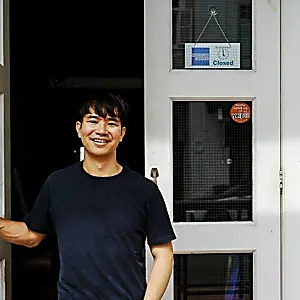Jelebu Dry Laksa, Two Hands Two Woks and Eat My CB – “CB” stands for “curry bun” – are some of the home-based food businesses born out of the difficult “circuit breaker” period, courtesy of some resilient Singaporeans who turned lost jobs into opportunity.

Renee Tang Eyrn worked in a restaurant kitchen for about a year before devoting herself to the pursuit of dry laksa. (Photo: Renee Tang Eyrn)
Amid the grim reality of COVID-19’s battering blows to the F&B industry, it’s hard not to consider a possible reality where only the fittest have a chance at survival.
Often, being fit doesn’t mean working harder but working smarter – and having the courage and drive to adapt, invent and find a new niche.
Jelebu Dry Laksa, Two Hands Two Woks and Eat My CB – “CB” stands for “curry bun”, what were you thinking? – are three home-based businesses started by food professionals during the “circuit breaker” period.
Each was born out of loss of employment and income, as well as a desire to share good, homemade comfort food with people.
Thanks to these businesses, we now have the option of ordering a one-of-a-kind dry laksa topped with lobster, prawns or sakura ebi; a curry fish head dish that’s faithful to grandma’s recipe; or a levelled-up rendition of curry-in-a-loaf.
All are dishes developed with culinary expertise and freshly cooked using quality ingredients.

Dry laksa topped with fresh lobster, anyone? (Photo: Jelebu Dry Laksa)
Could this be the start of a true local food renaissance – a ground-up movement, like the birth of hawker culture – where more of us will be able to enjoy authentic, family-recipe dishes made with quality and care?
It’s far too early to say, but if these cooks can make lemonade out of life’s adversity, then it’s also a good day for those of us who love our local food.
LAKSA, LOBSTER AND A WOK-HEI TWIST
Some of us dream of mansions; Renee Tang Eyrn dreams of dry laksa.
Two years ago, the 26-year-old quit a corporate job to pursue that dream, with plans of moving to Los Angeles and opening a food truck serving chilli crab buns, satay buns and, of course, dry laksa.

Jelebu Dry Laksa with butter-poached Boston lobster. (Photo: @aaronwong.sg)
To prepare herself for that venture, the avid home cook decided she needed to get some F&B experience under her belt, and snagged a job in the kitchen of a restaurant in the buzzy Amoy Street area.
But when COVID-19 struck and the restaurant took a big hit, Tang knew she had to find a new source of income – and maybe even get a head start on her dreams of owning her own business.
“I am a firm believer in the saying, ‘Go big or go home’” – although “of course, I would be operating the business from home,” she quipped.
Since she’d already been experimenting with her dry laksa recipe, focusing on making it takeaway-friendly so it would be practical to sell from a food truck, she decided to see if there was a market for her interpretation of laksa, which is conventionally a soupy dish.

Renee Tang Eyrn worked in a restaurant kitchen for about a year before devoting herself to the pursuit of dry laksa. (Photo: Renee Tang Eyrn)
“There aren’t many dry laksas around,” she said, so that makes her dish unique and interesting. What’s more, “I wanted to share my take on the traditional laksa, but with toppings that are uncommon, like lobster, grilled tiger prawns and sakura ebi.”
For S$25, you can get half a butter-poached Boston lobster (S$48 for a whole lobster) sitting atop your dry laksa, which is made with Tang’s own blend of 12 herbs and spices, and infused with organic young coconut milk.
ADVERTISEMENT
RECOMMENDED

SINGAPORE
People are 'dying to get out': Restaurants see dinner crowds as Singapore enters Phase 2 of reopening

SINGAPORE
Bring your own containers take a backseat at some eateries amid COVID-19 pandemic
https://cnaluxury.channelnewsasia.com/experiences/dumplings-dragon-boat-festival-singapore-12851538
Recommended by
Dry laksa with grilled tiger prawns goes for S$15, while the crispy sakura ebi option costs S$12 – and you can even choose to add “lala” clams for an extra S$2.
The brand is named Jelebu Dry Laksa after Jelebu Road in Bukit Panjang, where Tang lives. In her tiny kitchen, she does all the cooking herself – although she does get support from her mum in the form of lifts to the market in the early mornings to score the freshest laksa leaves.
It also helps that her partner is a chef at a restaurant and is able to help her procure supplies.

Jelebu Dry Laksa with grilled tiger prawns, which are sourced locally from a Singapore kelong. (Photo: @aaronwong.sg)
For her deliveries, “I partnered up with a very reliable courier company, Dropoffsg.com, which was also founded mainly due to COVID-19. They aim to offer deliveries with a personal touch (and) the majority of the staff are people from the F&B industry,” she said, adding that she’s happy to work with them because “we all need that support and extra helping hand.”
Moreover, “The idea of making someone happy when food comes knocking on their door is very apt.”
Jelebu Dry Laksa currently sells an average of 20 to 30 laksas a day, with a high of 48 bowls in one day in the week that it launched.
“Getting positive feedback from customers motivates me,” Tang said. “Dry laksa has always been my passion… I aspire to establish a household brand – for dry laksa to be as popular as Hokkien mee, chicken rice or char kway teow.”
That go-big-or-go-home spirit is certainly standing her in good stead. “I started Jelebu Dry Laksa with the investment of a wok, a ladle and the cost of food supplies. I went into it with the same confidence and determination as when I first entered the kitchen without experience,” she said. “If I could make something out of myself from scratch then, I can do the same now.”
Order Jelebu Dry Laksa here.
https://cnalifestyle.channelnewsasi...y-laksa-two-hands-two-woks-eat-my-cb-12819170

Renee Tang Eyrn worked in a restaurant kitchen for about a year before devoting herself to the pursuit of dry laksa. (Photo: Renee Tang Eyrn)
Amid the grim reality of COVID-19’s battering blows to the F&B industry, it’s hard not to consider a possible reality where only the fittest have a chance at survival.
Often, being fit doesn’t mean working harder but working smarter – and having the courage and drive to adapt, invent and find a new niche.
Jelebu Dry Laksa, Two Hands Two Woks and Eat My CB – “CB” stands for “curry bun”, what were you thinking? – are three home-based businesses started by food professionals during the “circuit breaker” period.
Each was born out of loss of employment and income, as well as a desire to share good, homemade comfort food with people.
Thanks to these businesses, we now have the option of ordering a one-of-a-kind dry laksa topped with lobster, prawns or sakura ebi; a curry fish head dish that’s faithful to grandma’s recipe; or a levelled-up rendition of curry-in-a-loaf.
All are dishes developed with culinary expertise and freshly cooked using quality ingredients.

Dry laksa topped with fresh lobster, anyone? (Photo: Jelebu Dry Laksa)
Could this be the start of a true local food renaissance – a ground-up movement, like the birth of hawker culture – where more of us will be able to enjoy authentic, family-recipe dishes made with quality and care?
It’s far too early to say, but if these cooks can make lemonade out of life’s adversity, then it’s also a good day for those of us who love our local food.
LAKSA, LOBSTER AND A WOK-HEI TWIST
Some of us dream of mansions; Renee Tang Eyrn dreams of dry laksa.
Two years ago, the 26-year-old quit a corporate job to pursue that dream, with plans of moving to Los Angeles and opening a food truck serving chilli crab buns, satay buns and, of course, dry laksa.

Jelebu Dry Laksa with butter-poached Boston lobster. (Photo: @aaronwong.sg)
To prepare herself for that venture, the avid home cook decided she needed to get some F&B experience under her belt, and snagged a job in the kitchen of a restaurant in the buzzy Amoy Street area.
But when COVID-19 struck and the restaurant took a big hit, Tang knew she had to find a new source of income – and maybe even get a head start on her dreams of owning her own business.
“I am a firm believer in the saying, ‘Go big or go home’” – although “of course, I would be operating the business from home,” she quipped.
Since she’d already been experimenting with her dry laksa recipe, focusing on making it takeaway-friendly so it would be practical to sell from a food truck, she decided to see if there was a market for her interpretation of laksa, which is conventionally a soupy dish.

Renee Tang Eyrn worked in a restaurant kitchen for about a year before devoting herself to the pursuit of dry laksa. (Photo: Renee Tang Eyrn)
“There aren’t many dry laksas around,” she said, so that makes her dish unique and interesting. What’s more, “I wanted to share my take on the traditional laksa, but with toppings that are uncommon, like lobster, grilled tiger prawns and sakura ebi.”
For S$25, you can get half a butter-poached Boston lobster (S$48 for a whole lobster) sitting atop your dry laksa, which is made with Tang’s own blend of 12 herbs and spices, and infused with organic young coconut milk.
ADVERTISEMENT
RECOMMENDED

SINGAPORE
People are 'dying to get out': Restaurants see dinner crowds as Singapore enters Phase 2 of reopening

SINGAPORE
Bring your own containers take a backseat at some eateries amid COVID-19 pandemic
https://cnaluxury.channelnewsasia.com/experiences/dumplings-dragon-boat-festival-singapore-12851538
Recommended by
Dry laksa with grilled tiger prawns goes for S$15, while the crispy sakura ebi option costs S$12 – and you can even choose to add “lala” clams for an extra S$2.
The brand is named Jelebu Dry Laksa after Jelebu Road in Bukit Panjang, where Tang lives. In her tiny kitchen, she does all the cooking herself – although she does get support from her mum in the form of lifts to the market in the early mornings to score the freshest laksa leaves.
It also helps that her partner is a chef at a restaurant and is able to help her procure supplies.

Jelebu Dry Laksa with grilled tiger prawns, which are sourced locally from a Singapore kelong. (Photo: @aaronwong.sg)
For her deliveries, “I partnered up with a very reliable courier company, Dropoffsg.com, which was also founded mainly due to COVID-19. They aim to offer deliveries with a personal touch (and) the majority of the staff are people from the F&B industry,” she said, adding that she’s happy to work with them because “we all need that support and extra helping hand.”
Moreover, “The idea of making someone happy when food comes knocking on their door is very apt.”
Jelebu Dry Laksa currently sells an average of 20 to 30 laksas a day, with a high of 48 bowls in one day in the week that it launched.
“Getting positive feedback from customers motivates me,” Tang said. “Dry laksa has always been my passion… I aspire to establish a household brand – for dry laksa to be as popular as Hokkien mee, chicken rice or char kway teow.”
That go-big-or-go-home spirit is certainly standing her in good stead. “I started Jelebu Dry Laksa with the investment of a wok, a ladle and the cost of food supplies. I went into it with the same confidence and determination as when I first entered the kitchen without experience,” she said. “If I could make something out of myself from scratch then, I can do the same now.”
Order Jelebu Dry Laksa here.
https://cnalifestyle.channelnewsasi...y-laksa-two-hands-two-woks-eat-my-cb-12819170

 NEWSCocktail bar Jekyll & Hyde to reopen after teaming up with cafe…
NEWSCocktail bar Jekyll & Hyde to reopen after teaming up with cafe…



